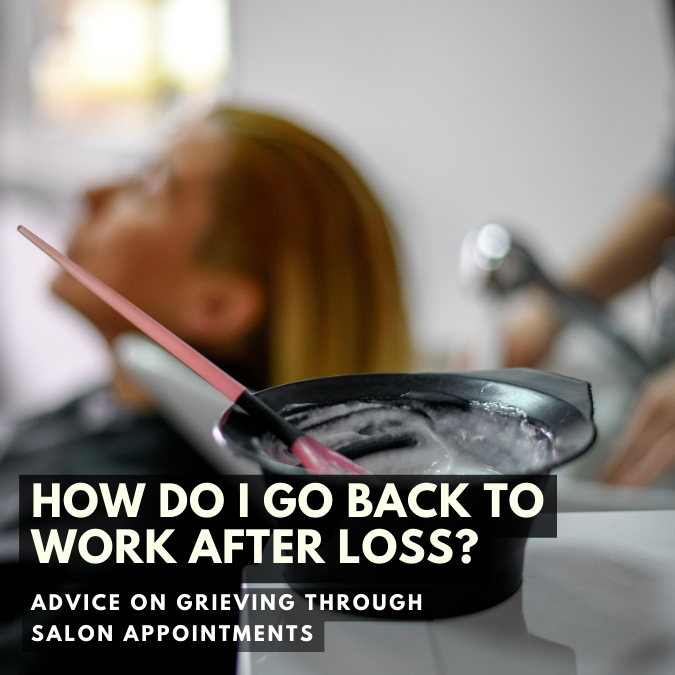How To Return To Work While Grieving
Dealing With Grief In The Salon From Stylists Who Have Done it & Client Letters You May Need
If you’re reading this, we’re here for you. The decision to (or to not) return to work after great loss is difficult. The internal conversation can feel off-putting knowing returning to a social and energetic place of work does not reflect your current day-to-day.
Showing up to service clients when your world has fallen apart opens a lot of emotional doors. No matter where you’re at in your grief, we’ll meet you there—we reached out to our BTC Facebook fam for personal experiences that can help a fellow stylist navigate their path back to work. Take your time, take a seat, and take a few minutes for yourself to scroll through some helpful advice and validation that you are not alone in these dark days.
“What if I just cry all day when I go back to the salon?”
Believe it or not, you can cry at work—you’re human! As uncomfortable and embarrassing as you think it may feel, we have BTC fam who have been there with advice to share.
- “I cried A LOT in front of others. My mom was my best friend and I truly worried I’d never feel like smiling again. Have your salon communicate the time off to clients as you ease back in. My clients were very understanding. When I returned to work my clients and coworkers were so understanding,” says Dawn Nosker.
- “After losing my son unexpectedly at 35 weeks pregnant, the thought of going back to work terrified me. I didn’t know how people would react towards me, how I would react to questions, what I would do if I was going to cry…it was hard. I started back slow and people were very sympathetic, understanding, compassionate and comforting. I made it through,” says Katie Bunner.
- “I cried a lot and my clients cried with me. They gave me my turn to vent and honestly they helped me through the grieving process,” says Abbie Garza.
Click below for FREE downloadable letters of notice, absence & schedule changes for you or your employees:
- Notice About Your Upcoming Appointment Letter
- Leave of Absence Notice
- AFFIRMATIONS for the days you need a virtual hug
“Do I Talk About It? Do I Tell My Clients?”
The right answer lies within your personality and comfortability with your own clients. If you are a talker, and chatting is therapeutic, don’t hide your truth. If you prefer to keep work at work and use your home as your grieving space, that is what you should try.
- “I’m very close to my family and I talk about them all the time so most of my clients know but occasionally I will have people ask about them because I haven’t mentioned anything about them and I have to tell them. It’s like a punch in the stomach every time. Sometimes it’s easier to not talk about it while other times I’m crying along with a customer,” says Maria Natale Edge.
- “There were last minute cancellations, sometimes I’d have to excuse myself for phone calls with doctors and hospice. People are very kind and understanding. Staying busy helped me so much,” says Joanne Babiarz.
- “If there’s one piece of advice I could give, reach out! Write the letter, if you have a receptionist at the salon ask them to take notes for clients needing to be rearranged. The better communication, the easier the transition,” says Katy Mullings.
- “It was therapeutic for me. I lost my dad suddenly and received the call while I was with a client. I lost my mother 2 years later. I went back to work at one week after each loss. Sharing grief with our clients in addition to our joys is so good for both sides,” says CaraSue Hall.
- “A year and a half later, a client told me that me telling his story (about my brother’s passing) and being open about the pain prevented her from attempting suicide. That right there shows you that we all need to talk about it. I’m not saying all the time, but we are all humans and like someone said, not robots. I had been pondering if I was doing what I was meant to do in this crazy life… that showed me that I am right where I need to be,” says Tami Woodroof.
It Is Not Selfish To Want To Return To Work
Grief looks different on everyone. Unfortunately, if you don’t fit the “take time off” narrative, you can be put through a lot of guilt. The reality is, life goes on with or without a daily routine. If you feel your “best” at work or want to try and feel a sense of normal, GO!
- “I went straight back to work after losing my much-loved parents both times. I needed the normalcy and chatter. I needed the focus. I guess I was escaping from delving too deeply, but it worked for me. I didn’t need to sit home alone in my own misery. I found I could get myself into work mode and get through the day ok. We are all individuals and must do what we feel is best for us,” says Jane Dale.
- “I couldn’t take time off when my mom passed since I would have had absolutely zero income. My boss was not helpful in this situation, so I had to take moments away from clients to cry. A lot of my clients understood my situation and some I never told at all. It was one of the hardest times of my life since I couldn’t just hide and deal with my emotions. Hats off to all that have lost someone and had to battle that loss behind the chair. Truly the hardest,” says Kris Lavoie.
- “I took a week off after tragically losing my husband. I couldn’t sit and stare at four walls…I had to get back to work to support my three young daughters! It was hard to concentrate but I had no choice then to push through it. I do know that I was in shock for a good month,” says Jan Streb-Perkins.
- “Lost my Mom in December of 2020. My clients were very comforting and understanding through her brief illness. There were last minute cancellations, sometimes I’d have to excuse myself for phone calls with Doctors and Hospice. People are very kind and understanding. Staying busy helped me so much,” says Joanne Babiarz.
- “I went back only five days after we had the stillbirth of our son at 24 weeks. Best decision I made. Talking about it and hearing the stories of a lot of my clients really helped me heal. It has been 10 years and I still have clients opening up about their experiences with loss whether it is a parent, spouse or child,” says Jan Mozol-Suknacki.
If You’re Not Ready To Go Back, You Don’t Have To Be
There is no prize in trying to be heroic for yourself. If you need time off, you need time off. Doing yourself a favor in the midst of not knowing what to do is a bond many stylists share through their stories:
- “I lost my dad unexpectedly in May, it’s very hard to be present each day. I’m basically just existing, it does help to keep my mind busy with work. But pretending that everything is ok is definitely exhausting. I worked part time to start and somehow how I let myself get booked up full time. I’m overwhelmed and I definitely suggest part time and sticking to your boundaries,” says Jennifer Curry-Bayer.
- “I just lost my dad to cancer on January 2nd. My clients let me cry while he was in hospice and I took a week off when he passed. We are human. We have emotions. Anyone who doesn’t understand that, needs to go somewhere else,” says Nikki Brewer.
- “I lost my husband at 43 years old. We were both 43. He had cancer and my clients knew he was sick. My kids were 18, 16 and 12. I took three months off. Give yourself time to grieve if you can. I lost some clients but that’s because some didn’t know what to say to me. Being at work was therapeutic when I got back. Do what’s best for you. It’s never easy, regardless,” says Kathy Craney Schwink.
- I lost my mother in July and then my 10 year-old nephew tragically six weeks after. I gave myself permission both times to take the time I needed. Yes my books looked differently the rest of the year, and that was ok. I decided that if clients weren’t understanding that were no longing guests I needed to see. At the end of my life it will be important to me that I was there for myself and my family during these times,” says Katy Mullings.
- If it was possible, I definitely would have taken more time off. I just can’t get back into the swing of it all just yet but I do my best to put a smile on and go about the day,” says Maria Natale Edge.
- “I took six weeks off after I lost my daughter. It has been a year and I am finding it harder as time goes on. It’s exhausting, so I reduced my days and extended my hours the days I do work. It’s worked for me. But everyone needs to do what works for them and that could change as time goes on,” says Pam Hardman.
Salon Owners, Here’s How You Can Help Your Employees
There is no manual, so it’s up to you to make one! Being understanding and accommodating while running a business takes some juggling, but it is certainly not impossible.
- “As a salon owner I had a stylist that was and is an employee based commission salon. Her mother passed unexpectedly very young (57) she had a very hard time. She took two weeks off then came back half days for like a month after that then slowly added an hour to her days every week until she was back to her old schedule. It takes time. It’s very hard. At first when she came back we would make her confirmation calls we would give the client a heads up and they were so understanding,” says Amy Paquette.
- “When I lost my daughter, I absolutely couldn’t talk about it at all with out sobbing. My salon did send out a letter with a brief explanation of what had happened , when I was returning and that I couldn’t talk about it. I started with shorter shifts at first. You do what is best for you. Everyone will understand,” says Colleen Zokoe-Campos.
Action steps to take immediately:
- If possible, set a day to check in with your employee: “You will hear from me next week on Tuesday to plan what you would like your return schedule to look like.”
- Doing this gives the business flexibility to rebook clients in the interim and gives your employees the space to leave work off their mind.
- Reach out to your employee’s immediate appointments.
- This business is tight knit, so be continuous about your employees wanting to share their own news. If there are clients coming in immediately following news of loss, explain schedule change opportunities.
- Take care of your employee’s space.
- Know your employee had to leave frantically? Clean their station, restock what is needed and prepare what you can for their return.
- Prepare a letter for your employee to send to their clients.
- Communicating sad news is not easy. Take the effort out of your client’s announcement by preparing a letter or statement they can approve or edit to their needs.








